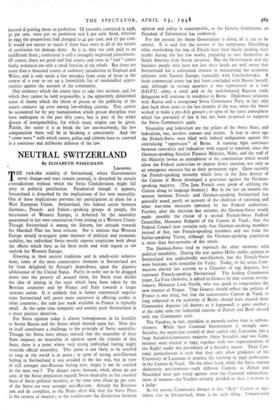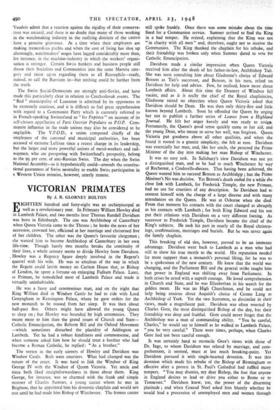NEUTRAL SWITZERLAND
By ELIZABETH WISKEMANN Lausanne.
THE rock-like stability of Switzerland, where Governments never change, and wars remain external; is disturbed by certain contradictions without which the Swiss 'Confederation might fall prey to political petrifaction. Paradoxical though it appears, Switzerland is disturbed by the implications of her very neutrality. One of these implications prevents her participation in plans, for a West European Union. Switzerland, this federal union between German-, French- and Italian - speaking groups of people, the microcosm of Western Europe, is debarred by the neutrality guaranteed in her own constitution from joining in a Western Union. Though Switzerland is among the Sixteen, her attitude towards the Marshall Plan has been reticent. She is anxious that Western Europe should re-acquire some measure of political and economic stability, but individual Swiss mostly express scepticism both about the efforts which have so far been made and with regard to the outlook for Western Europe._
Glorying in their ancient traditions and in small-scale achieve- ment, some of the most conservative elements in Switzerland are far from delighted by Europe's dependence upon the gigantic adolescence of the United States. Partly in order not to be dragged down into the poverty all around them, the Swiss even dislike the idea of joining in the steps which have been taken by the Benelux countries and by France and Italy towards a larger customs union. It is unlikely that in future commercial negotia- tions Switzerland will prove more expansive in offering credits to other countries ; the sum just made available to France is typically small. At the same time sympathy and anxiety push Switzerland in a more positive direction.
For Swiss opinion today is almost homogeneous in its hostility to Soviet Russia and the States which depend upon her. Now this in itself constitutes a challenge to the principle of Swiss neutrality. Though the Swiss have always insisted that the neutrality of their State imposes no neutrality of opinion upon the citizens of this State, there is a point where very strong individual feeling might override official neutrality. This point is..not likely to be reached so long as the world is at peace ; in spite of strong anti-German feeling in Switzerland it was avoided in the last war, but in view of still stronger anti-Russian feeling now, might it not be reached in the next war ? The danger exists because, while about 90 per cent. of the Swiss population regards Swiss neutrality as the essential basis of Swiss political morality, at the same time about 95 per cent. of the Swiss are very strongly anti-Russian. Already the Russians can and do complain, as the Nazis often did, that the Swiss Press is the reverse of neutral ; to the totalitarians the distinction between opinion and policy is unacceptable, as the Geneva Conference on Freedom of Information has confirmed.
For the present the Swiss Government is doing all it can to be correct. It is said that the owners of the sumptuous Ziirichberg villas overlooking the lake of Zurich have been busily packing their trunks during the last few weeks, preparing to save themselves in South America from Soviet invasion. But the Government and the business people who have not lost their heads are well aware that Switzerland has a substantial interest in maintaining her economic relations with Eastern Europe, especially with Czechoslovakia. A .fresh commercial treaty has just been concluded with Russia herself, and, although in certain quarters it was represented as a vast O.G.P.U. army, a small and so far well-behaved Russian trade delegation will continue its residence in Berne. Diplomatic relations with Russia and a recognised Swiss Communist Party in fact only date back three years to the last months of the war, when the Swiss wished to make a pro-Ally gesture ; in spite of the tense atmosphere which has prevailed of late it has not been proposed to suppress the Swiss Communists again.
Neutrality and federalism are the pillars of the Swiss State, and federalism, too, involves stresses and strains. A year or more ago the French-Swiss were filled with federal indignation against the centralising " oppression " of Berne. A running fight continues between centralists and federalists with regard to taxation, since the German-speaking Socialist Finance Minister, Nobs, and the staff of his Ministry favour an amendment of the constitution which would allow the Federal authorities to impose direct taxation, not only as an emergency measure but as their permanent right. Quite recently the French-speaking minority which lives in the Jura district of the Canton of Berne developed a grievance against the German- speaking majority. (The Jura French even speak of splitting the Canton along its language frontier.) But in the last six months the tension between French- and German-speaking Switzerland has generally eased, partly on account of the abolition of rationing and other war-time measures operated by the Federal authorities. Further, after the elections last autumn, the German-Swiss wisely made possible the choice of a second French-Swiss Federal Councillor, Monsieur Rubgnel of the Canton de Vaud ; thus the Federal Council now contains only four German-speaking members instead of five, two French-speaking members and one from the Italian-speaking Ticino, although the German-speaking population is more than five-sevenths of the whole.
The German-Swiss tend to reproach the other elements with political instability. During the war against Hitler public opinion in Switzerland was undoubtedly anti-German, but the French-Swiss were hesitant, with sympathy for Vichy. Today, of the seven Com- munists elected last autumn to a Chamber of 194 deputies, five represent French-speaking Switzerland. The leading Communist paper, La Voix Ouvriere, is edited in Geneva by that veteran revolu- tionary, Monsieur Leon Nicole, who was quick to congratulate the new masters of Prague. That Geneva should reflect the politics of France is one thing, but that the conservative Canton de Vaud, so long subjected to the authority of Berne, should have elected three Communist deputies (all doctors as it happened) is quite another ; at the same time the industrial cantons of Zurich and Basle elected only one Communist each.
The Vaudois, in fact, specialise in anomaly rather than in subver- siveness. While their Cantonal Government is strongly anti- Socialist, the municipal council of their capital city, Lausanne, has a large Socialist-Communist majority (three Socialists and two Com- munists were elected in 1945, together with two representatives of the Right) under the presidency of a Socialist mayor. Their Can- tonal particularism is such that they only allow graduates of the University of Lausanne to practise the teaching or legal professions in the Canton de Vaud. On the other hand, while the Swiss remain obdurately anti-feminist—such different Cantons as Zurich and Neuchatel have just voted against even the Cantonal enfranchise- ment of women—the Vaudois recently decided to elect a woman as a judge.
As for serious Communist danger in this " Red " Canton or any- where else in Switzerland, there is no such thing. Conservative
--Vaudois admit that a reaction against the rigidity of their conserva- tism was natural, and there is no doubt that many of those working in the watchmaking industry in the outlying districts of the canton have a genuine grievance. At a time when their employers are making tremendous profits and when the cost of living has shot up alarmingly, watchmakers' wages have lagged considerably more than, for instance, in the machine-industry in which the workers' organi- sation is stronger. Certain Swiss bankers and business people still throw their Socialists and Communists into the same Marxist cate- gory and insist upon regarding them as all Russophile—ready, indeed, to call the Russians in—but nothing could be further from the truth.
The Swiss Social-Democrats are strongly anti-Soviet, and have made this particularly clear in relation to Czechoslovak events. The "Red " municipality of Lausanne is admitted by its opponents to be extremely cautious, and it is difficult to feel great apprehension with regard to a Communist Party which is currently referred to in French-speaking Switzerland as "les Popistes" on account of its self-chosen appellation of Parti Ouvrier Populaire or P.O.P. Com- munist influence in the trade unions may also be considered to be negligible. The V.P.O.D., a union composed chiefly of the employees of the cantonal and municipal authorities, has been accused of extreme Leftism since a recent change in its leadership, but the larger and more powerful unions of metal-workers and rail- waymen, who are prospering with Switzerland's prosperity, belong to the 95 per cent. of anti-Russian Swiss. The day when the Swiss National Assembly—as it hypothetically could—amends the constitu- tional guarantees of Swiss neutrality to enable Swiss participation in a Western Union remains, however, utterly remote.



































 Previous page
Previous page